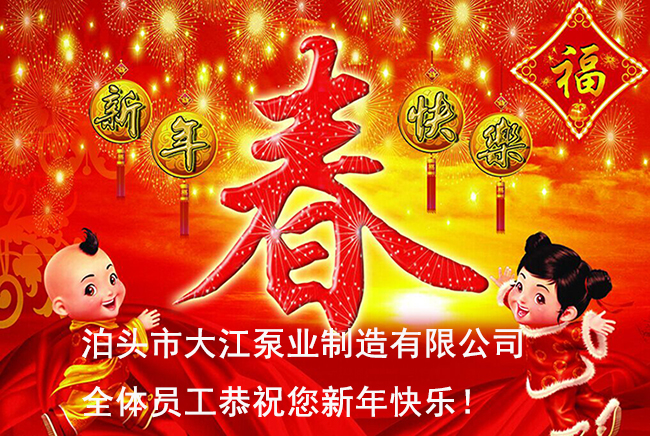新聞中心
15年春節放假安排通知

泊頭市大江泵業制造有限公司特此通知:
新春佳節漸近,為使全體員工度過一個歡樂、祥和、平安的新春佳節,切實做好節日期間的工作,根據_規定并結合公司實際情況,現將2015年春節放假安排通知如下 :
2015年2月8日 舉辦公司年會(具體事宜另行通知);
2015年2月9日—2015年2月25日 春節放假(共計17天);
2月26日(星期四)正式上班。 除此之外,不準許節前、節后請假。
大江泵業董事長攜全體員工恭祝您新年快樂!
春節是中國大的節日,傳統名稱為新年、大年、新歲,但口頭上又稱度歲、慶新歲、過年。古時春節曾專指節氣中的立春,也被視為是一年的開始,后來改為農歷正月初一開始為新年。一般至少要到正月十五(上元節)新年才結束,春節俗稱“年節”,是中華民族隆重的傳統佳節,漢武帝時期之前,各朝各代春節的日期并不一致,自漢武帝太初元年始,以夏歷(農歷)正月為歲首,年節的日期由此固定下來,延續至今,1911年辛亥革命以后,開始采用公歷計年,遂稱公歷1月1日為“元旦”,稱農歷正月初一為“春節”。
15 Chinese New Year holiday arrangements notice
Botou City, the major Pump Manufacturing Co. hereby notified:
Spring Festival approaching, to enable all employees to spend a happy, peaceful, peaceful New Year, take safety work during the holiday season, according to state regulations and the Company's actual situation, now 2015 Spring Festival holiday arrangements notified as follows:
February 8, 2015 annual meeting held in the company (the specific issues notice);
February 9, 2015 February 25 2015 Chinese New Year holiday (total of 22 days);
2 月 26 日 (星期四) official work. In addition, do not allow pre-holiday, holiday leave.
Oe Pump chairman with the staff wish you a Happy New Year!
Chinese New Year is the biggest holiday, the traditional name for the New Year, New Year Danian, but verbally, also known as the degree of years old, celebrate New Year, the Chinese New Year. Spring has specifically refers to the ancient solar terms in the beginning of spring, is also seen as the beginning of the year, and later changed to the lunar calendar for the new year began. Generally at least until the fifteenth day (Lantern Festival) before the end of the New Year, Spring Festival, commonly known as "New Year", is the most ceremonious traditional festival of the Chinese nation, before the Han Dynasty period, the Spring Festival, all toward each date is not consistent, since the Han Dynasty in the beginning was the beginning of the first year to the lunar calendar (lunar) month of Rosh Hashanah, the New Year's date thus fixed, until today, after the Revolution of 1911, began to use the Gregorian calendar year terms, then known as the Gregorian calendar January 1, "New Year" first lunar month is called "Spring Festival."


